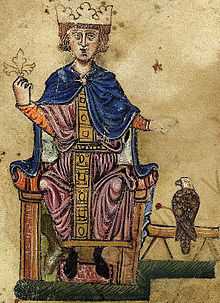Bibliotheca Palatina

The Bibliotheca Palatina ("Palatinate library") of Heidelberg was the most important library of the German Renaissance, numbering approximately 5,000 printed books and 3,524 manuscripts.
In the 1430s, Elector Louis III founded the Stiftsbibliothek in the Heiliggeistkirche, which had good light for reading. This library formed the core of the Palatine Collection established by Elector Ottheinrich in the 1550s, together with the University Library Heidelberg. Essential manuscripts from the original Bibliotheca Palatina include the Carolingian "Lorsch Evangelary", the Falkenbuch (De arte venandi cum avibus, cpl 1071, commissioned by Frederick II), and the Codex Manesse (cpg 848)
Further important manuscripts were acquired from the collection of Ulrich Fugger (d. 1584), notably the illustrated Sachsenspiegel (cpg 164). Joseph Scaliger considered this Fugger Library superior to that owned by the Pope; the manuscripts alone were valued at 80,000 crowns, a very considerable sum in the 16th century.[1]
Thirty Years War
The Palatinate suffered heavily in the Thirty Years War, and in 1622 Heidelberg was sacked by the Catholic League, whose general Count von Tilly was in the employ of Maximilian of Bavaria. Although many books were torn or "dispersed among private hands"[1] during the sack, Maximilian found it prudent to confiscate the remaining manuscripts and present them to Pope Gregory XV as "a sign of his loyalty and esteem".[2] It was the first and most publicized act of booty in the Thirty Years' War. There were competing interests as to where the materials housed in the library would eventually go among the Catholic victors, but eventually Pope Gregory XV decreed that he would like to see the books from the library transported to Rome. The careful preparations undertaken to secure the library and transport it to Rome were supervised by the Greek scholar Leo Allatius, who was sent to Heidelberg by the Vatican. The victors were concerned not just to carry away the collection and thus strip the Calvinist party of one of its most important intellectual symbols; they also wanted to carry away its history, perhaps even making it impossible to reconstruct in memory. The capture of the Palatine library was to remain the most carefully orchestrated symbolic act of booty in the Thirty Years' War, although it triggered a succession of library lootings throughout the course of the hostilities.[3]
Since 1623, the entire library has been incorporated into the Bibliotheca Apostolica Vaticana, with each volume preserving, as a memorial, a leaf with the Wittelsbach arms.
By the Treaty of Tolentino (1797), the Pope ceded 37 manuscripts to the French Republic, which had them deposited in the Bibliothèque nationale in Paris. After the Congress of Vienna decreed "the general restoration of works of art, of which the French had robbed other countries",[1] the contested manuscripts were conveyed from Paris to Heidelberg, rather than to Rome.
In 1816, Prince Hardenberg and Ignaz Heinrich von Wessenberg persuaded Pope Pius VII to make a gift of 852 manuscripts (mostly in the German language) to the University of Heidelberg. For the University Jubilee, some other books were brought back from Vatican to be displayed at the Heiliggeistkirche.
See also
References

- ↑ 1.0 1.1 1.2 The Classical Journal for March and June 1816, page 212.
- ↑ Luther: Lectures on Romans, ed. by Wilhelm Pauck. Westminster John Knox Press, 1961. ISBN 0-664-24151-4. Page xxii.
- ↑ Bepler, J. (2001). Vicissitudo Temporum: Some Sidelights on Book Collecting in the Thirty Years War. Sixteenth Century Journal, 32(4), pp. 953-968. doi:10.2307/3648986
Bibliographies
- Leonard Boyle (ed.): Bibliotheca Palatina, Druckschriften, Microfiche Ausgabe, München 1989-1995, ISBN 3-598-32880-X (Gesamtwerk), ISBN 3-598-32919-9 (Index)
- Elmar Mittler (ed.): Bibliotheca Palatina, Druckschriften, Katalog zur Mikrofiche-Ausgabe, Band 1-4, München 1999, ISBN 3-598-32886-9
- Ludwig Schuba, Die medizinischen Handschriften der Codices Palatini Latini in der Vatikanischen Bibliothek, Wiesbaden, 1981, Dr. Ludwig Reichert Verlag (Kataloge der Universitätsbibliothek Heidelberg 1), ISBN 3-88226-060-2
- Ludwig Schuba, Die Quadriviums-Handschriften der Codices Palatini Latini in der Vatikanischen Bibliothek, Wiesbaden 1992, Dr. Ludwig Reichert Verlag (Kataloge der Universitätsbibliothek Heidelberg 2), ISBN 3-88226-515-9
- Dorothea Walz, Die historischen und philosophischen Handschriften der Codices Palatini Latini in der Vatikanischen Bibliothek (Cod. Pal. Lat. 921 - 1078), Wiesbaden 1999, Dr. Ludwig Reichert Verlag (Kataloge der Universitätsbibliothek Heidelberg 3), ISBN 3-89500-046-9
| |||||||||||||||||||||||||||||||||||||

